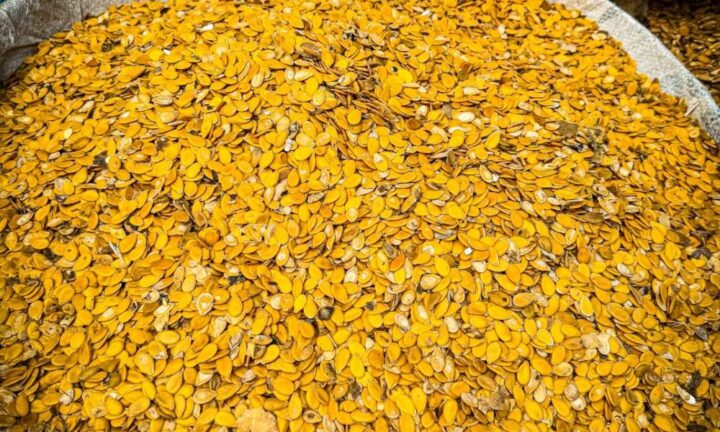Nigeria celebrated a historic milestone as egusi seeds were officially launched into space, becoming the nation’s first indigenous agricultural product to be carried beyond Earth, in a high-altitude scientific mission aimed at advancing food research under microgravity conditions.
The mission, conducted by a Nigerian university in partnership with an international space research institute, included a small payload capsule laden with carefully sealed egusi seeds. Lifted aboard a suborbital rocket, the seeds traveled to the edge of space, exposing them to microgravity, cosmic radiation, and other extreme conditions before being retrieved and returned to Nigeria for analysis.

Scientists and stakeholders hailed the development as a bold intersection of Nigeria’s agricultural heritage and emerging space science capabilities. Lead researcher Dr. Funke Adeyemi explained that the project seeks to investigate how space environmental factors might influence seed germination rates, nutrient composition, and crop resilience—knowledge that could potentially lead to innovations in farming techniques or seed preservation.
The payload launch took place in early July and was coordinated by the National Space Research Consortium alongside the local university’s Department of Agricultural Biotechnology. The fragile capsules were designed to withstand launch vibrations and preserve the integrity of the seeds, which were retrieved intact following descent. Back in the laboratories, researchers began controlled germination experiments to compare space-exposed seeds with their earthbound counterparts.
For eons, egusi—derived from species of melon—and its seeds have been staple elements of West African cuisine. Now, this humble commodity is at the forefront of a new orbit-focused research frontier. Officials from the Ministry of Science and Technology stated that the experiment represents Nigeria’s first domestically led seed-based space science mission, signaling the country’s broader ambitions to leverage space technology for agricultural advancement.
President stated in a video message that the launch marked a proud moment for both science and culture. “Today, what our mothers plant and cook for generations has journeyed into the cosmos,” he said. “It’s a symbol of how traditional knowledge and modern innovation can elevate our national identity and open new possibilities.”
Researchers hope that results from the mission, due in several months, may inform new strategies for seed storage, strain development, or climate adaptation. If space-exposed seeds show accelerated germination, improved vigor, or nutrient changes, it could lead to pilot projects in seed banks, experimental plots, or even higher-altitude agriculture facilities.
The project has captured the public imagination, with social media users expressing pride in Nigeria’s scientific creativity and heritage centric innovation. Memes, news stories, and university-led events have drawn attention to the launch, making the mission a point of national conversation around science, food, and futuristic ambition.
Critics caution that while symbolic, the scientific value will depend on measurable outcomes. They emphasize the need for long-term field trials and peer-reviewed validation before any ecological or commercial interpretation is made. Nevertheless, the planning team said the mission was followed by rigorous scientific protocols, data logging, and blending of traditional seed varieties in trials.
Explaining future directions, project coordinators revealed follow-up missions may include additional staple seeds—such as sorghum, millet or yam seed tubers—and expanded research collaboration with aerospace agencies. Discussions are underway with research institutions to compare Nigerian seed behavior in space with global experiments involving corn, wheat, or legumes.
Academics also see potential in integrating space agronomy modules into university curricula, reflecting a growing interest in agri-space research. Postgraduate students are already contributing to the experiment design, germination controls, and data modelling necessary to interpret any observed biological variations linked to space exposure.
The experiment also serves as public proof-of-concept for Nigeria’s growing ability to undertake internationally coordinated science missions. While the payload was small and experimental, it marked the first time a locally derived seed payload received formal tracking, launch, and recovery coordination under stringent aerospace protocols.
If data from the experiment prove promising, researchers say it could justify Nigeria’s involvement in larger space agriculture projects—potentially involving longer-duration orbital missions, bioregenerative system research, or ground-based analog testing within controlled environments.
Ultimately, the egusi seeds’ space journey was more than a scientific novelty—it was a symbolic bridge between Nigeria’s rich agricultural tradition and its technological foresight. It also served as an invitation for young scientists, farmers, and culinary innovators to see that innovation can spring from homegrown sources.
As capsule analysis continues and results are made public, the nation awaits the findings with optimism. If even modest differences in seed behavior emerge, this experiment may seed a new field—space agriculture—within Nigeria’s rising tech and research ecosystem.
Support InfoStride News' Credible Journalism: Only credible journalism can guarantee a fair, accountable and transparent society, including democracy and government. It involves a lot of efforts and money. We need your support. Click here to Donate
